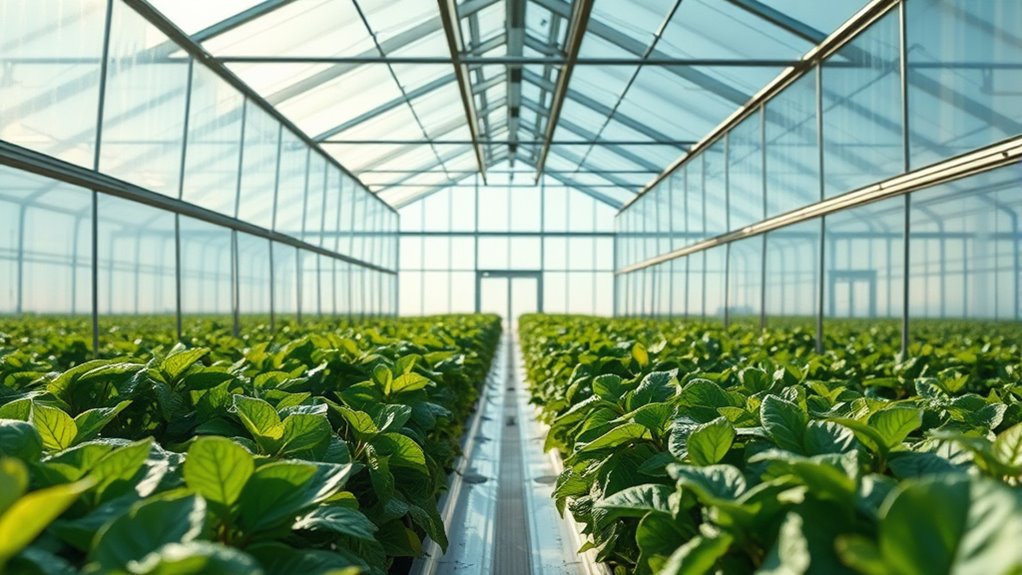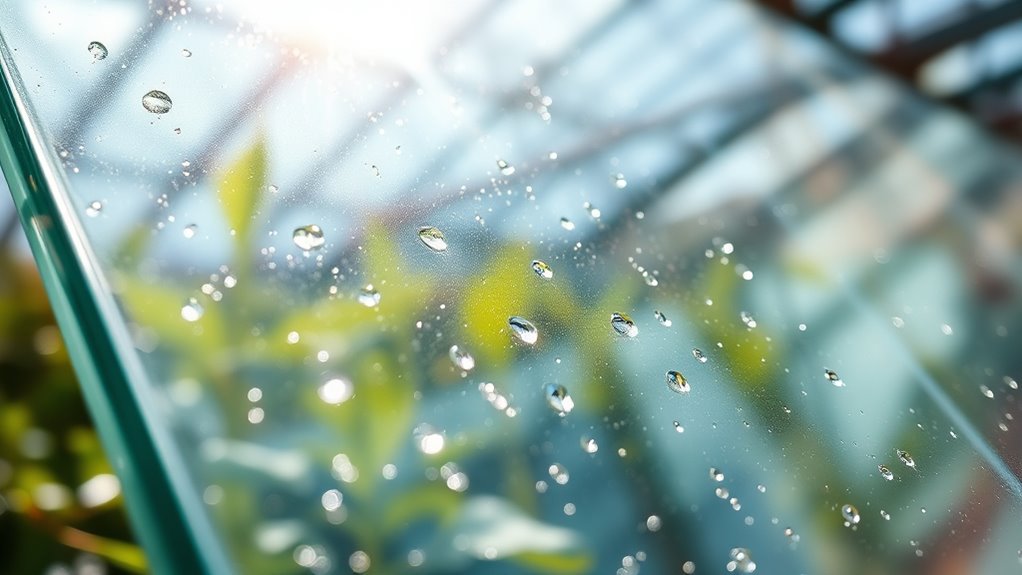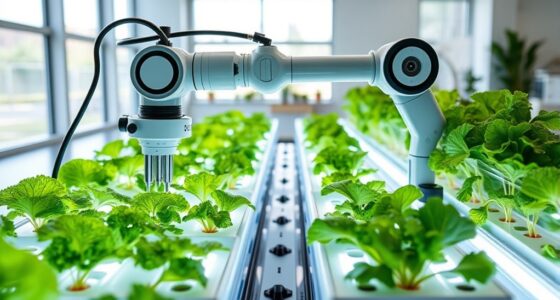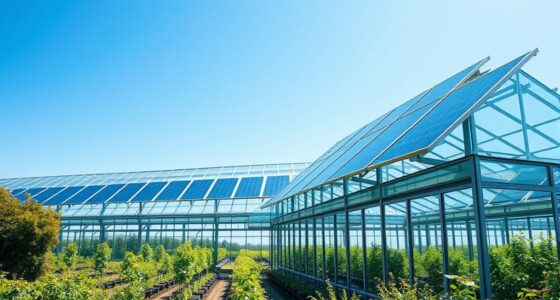Nano-coated glass can dramatically boost your greenhouse’s light transmission and efficiency, helping plants grow healthier. It also creates a self-cleaning barrier that repels dirt, water spots, and algae, reducing maintenance efforts and costs. The durable coating resists scratches, chemicals, and UV damage, ensuring long-term performance. By using this innovative glass, you’ll enhance sustainability and save resources. Want to discover more about how nano-coating can transform your greenhouse? Keep exploring the benefits.
Key Takeaways
- Nano-coated glass enhances sunlight transmission, boosting greenhouse solar efficiency and supporting healthier plant growth.
- It creates a self-cleaning surface that repels dirt, water spots, and grime, reducing maintenance efforts.
- The coating resists scratches, chemicals, and UV degradation, ensuring long-term durability and performance.
- It decreases the need for cleaning chemicals and water, promoting eco-friendly and cost-effective operations.
- Overall, nano-coated glass maximizes light, minimizes maintenance, and extends the lifespan of greenhouse structures.

Have you ever wondered how glass can become more durable and easier to clean? Nano-coated glass does just that, offering innovative solutions that transform the way you use and maintain glass surfaces. When applied to greenhouse panels, this technology can markedly boost solar efficiency, allowing more sunlight to pass through while reducing energy loss. The ultra-thin nano-layer creates a barrier that minimizes dirt, water spots, and grime buildup, which means your glass stays clearer longer and absorbs more light. With increased solar efficiency, your greenhouse can maximize plant growth and energy collection, making your operations more productive and sustainable.
You’ll find that nano-coated glass also drastically reduces the time and effort needed for maintenance. Traditional cleaning involves scrubbing off stubborn dirt, wiping away water stains, and sometimes using harsh chemicals, which can be both time-consuming and costly. But with nano-coatings, water simply beads up and rolls off, taking dirt and dust with it. This self-cleaning property means you spend less time and resources on upkeep, and you don’t have to worry about frequent cleanings or damaging the glass with abrasive scrubbing. As a result, your greenhouse remains pristine without interrupting your daily routines or risking damage to the panels.
Moreover, nano-coatings are incredibly durable. They resist scratches, chemical corrosion, and UV degradation, so your glass stays protected over time. This longevity not only enhances the overall durability of your greenhouse but also ensures consistent performance. The protective layer also helps prevent the buildup of algae and mold, which can compromise both the cleanliness and the structural integrity of your glass. By maintaining a cleaner environment with less effort, you promote healthier plant growth and extend the lifespan of your greenhouse infrastructure.
In addition, because nano-coated glass reduces the need for frequent cleaning, you lower your reliance on cleaning chemicals and water usage, making your greenhouse more environmentally friendly. This eco-conscious approach aligns with sustainable practices, cutting down on waste and resource consumption while keeping your setup in top shape. The combination of improved solar efficiency and maintenance reduction not only benefits your operational costs but also contributes to a greener, more efficient greenhouse environment.
Frequently Asked Questions
How Long Does Nano-Coating Last on Glass Surfaces?
You might wonder how long nano-coating lasts on glass surfaces. Typically, the durability lifespan or coating longevity depends on usage, cleaning methods, and environmental exposure. Generally, nano-coatings can last several years if properly maintained, often around 3 to 5 years. To maximize their longevity, avoid abrasive cleaners and harsh chemicals, and follow manufacturer guidelines. Proper care guarantees your coating continues to keep glass surfaces clean and supercharge light transmission effectively.
Is Nano-Coated Glass Environmentally Safe?
Imagine a shield protecting your garden—nano-coated glass offers eco-friendly benefits by reducing the need for harsh chemicals, making it safer for the environment. Generally, it’s considered chemically safe because it uses non-toxic materials, minimizing pollution and harm to wildlife. This eco-friendly approach guarantees you keep your greenhouse clean and productive without sacrificing safety, aligning with sustainable gardening practices that protect both plants and the planet.
Can Nano-Coating Be Applied to Existing Greenhouse Glass?
You can definitely apply nano-coating to existing greenhouse glass. The application techniques are straightforward, often involving spraying or dipping methods that guarantee even coverage. Plus, the coating’s durability means it lasts through weather conditions and cleaning cycles, providing long-term benefits. This makes it an effective upgrade for your greenhouse without needing to replace the glass entirely, supercharging light transmission and keeping it clean with minimal maintenance.
What Is the Cost Difference Between Nano-Coated and Regular Glass?
Think of nano-coated glass as a high-performance sports car compared to a standard sedan. The cost comparison shows nano-coated glass generally costs more upfront, but the investment pays off in reduced maintenance and energy savings. Installation expenses might be higher initially, but over time, the benefits—like keeping your greenhouse cleaner and boosting light transmission—can outweigh the extra cost. So, it’s a smarter choice for long-term efficiency.
How Resistant Is Nano-Coated Glass to Scratches and Physical Damage?
You wonder about nano-coated glass’s resistance to scratches and physical damage. It offers high scratch resistance, thanks to its durable coating that protects against everyday abrasions. Its physical durability is markedly enhanced, making it more resilient to impacts and rough handling. This means you’ll find nano-coated glass less likely to crack or scratch, ensuring longer-lasting performance and maintaining clarity over time, even in demanding environments like greenhouses.
Conclusion
So, next time you marvel at a spotless greenhouse, remember it’s probably thanks to nano-coated glass—keeping things pristine while silently boosting light. Ironically, this tiny coating holds the power to transform your greenhouse’s cleanliness and efficiency, all without any fuss. It’s a small innovation with a big impact, proving that sometimes, the tiniest tech can do the most to keep things shining—literally. Who knew brilliance could be so tiny?









